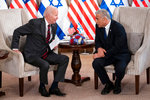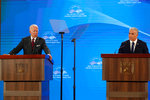

JERUSALEM (AP) — President Joe Biden said Thursday that the United States is “not going to wait forever” for Iran to rejoin a dormant nuclear deal, a day after saying he’d be willing to use force as a last resort against Tehran if necessary.
Biden made the comments at a news conference after meeting with Israeli Prime Minister Yair Lapid following one-on-one talks in which they discussed Iran's rapidly progressing nuclear program.
“We’ve laid out for the leadership of Iran what we’re willing to accept in order to get back into the JCPOA. We’re waiting for their response. When that will come, I’m not certain.," Biden said, using an acronym for the Iran nuclear deal. "But we’re not going to wait forever."
Resurrecting the nuclear deal brokered by Barack Obama’s administration and abandoned by Donald Trump in 2018 was a key priority for Biden as he entered office. But administration officials have become increasingly pessimistic about the chances of Iran returning to compliance.
Israeli officials have sought to use Biden's first visit to the Middle East as president to underscore that Iran's nuclear program has progressed too far and encourage the Biden administration to scuttle efforts to revive a 2015 agreement with Iran to limit its development.
In the joint statement, the United States said it is ready to use “all elements of its national power” to prevent Iran from obtaining a nuclear bomb.
In an interview with Israel's Channel 12 that aired Wednesday, Biden offered strong assurances of his determination to stop Iran from becoming a nuclear power, saying he’d be willing to use force as a “last resort” if necessary.
Iran announced last week that it had enriched uranium to 60% purity, a technical step away from weapons-grade quality.
The joint declaration being announced Thursday could hold important symbolic importance for Biden’s meeting this weekend with Arab leaders in Saudi Arabia as he seeks to strengthen a region-wide alliance against Iran.
“I talked about how important it was … for Israel to be totally integrated in the region,” Biden said after the one-on-one meeting with Lapid.
Thursday's meeting could also provide a boost to Lapid, who is serving as interim prime minister until elections in November, Israel’s fifth in less than four years. Lapid’s main opponent is the former prime minister, Benjamin Netanyahu, and the joint appearance with Biden could help burnish his credentials as a statesman and leader.
Given the U.S.'s status as Israel’s closest and most important ally, Biden is at the center of the country’s attention during his visit.
Israel staged an elaborate welcoming ceremony for him at the Tel Aviv airport, including a red carpet and a band that played the national anthem of both countries. Major television channels set up special live coverage of Biden’s arrival and even broadcast a nonstop loop of his motorcade traveling on the highway to Jerusalem.
Israel opposed the original nuclear deal, reached under President Obama in 2015 because its limitations on Iran’s nuclear enrichment would expire and the agreement didn’t address Iran's ballistic missile program or military activities in the region.
Instead of the U.S. re-entering the deal, from which Trump withdrew in 2018, Israel would prefer strict sanctions in hopes of leading to a more sweeping accord.